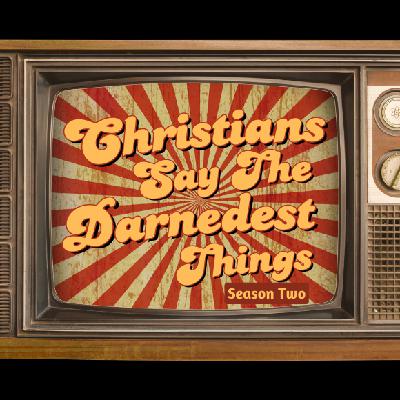Sound Faith
Description
The title of my sermon is a play on words. The beginning of this chapter we are told that what comes out of our mouths by way of teaching will incur a stricter judgment; therefore, anything we teach concerning God or His word must fall into the category of “sound doctrine.” On the other hand, the noise we make with our speech is evidence of what is really in our heart. Words matter. I will take it one step further—words matter to God. Proverbs 18:21 puts it this way: “Death and life are in the power of the tongue, and those who love it will eat its fruit.” Words matter.
The Bible and Creation begins with words! The first words in our Bible are about the first words responsible for everything beautiful and living: “In the beginning God created the heavens and the earth. And the earth was a formless and desolate emptiness, and darkness was over the surface of the deep, and the Spirit of God was hovering over the surface of the waters. Then God said, ‘Let there be light”; and there was light’” (Gen. 1:1-3). I love these verses in Genesis! In the beginning there was nothing but God... until He had something to say about it! His words brought life. Then what follows in Genesis 1 is a series of phrases like: “God said...” “God called...” What made all that exists a reality were WORDS! Not just any words from any old mouth, the Words that came from God made everything and all of it was good.
On the sixth day, God spoke more words: “Let Us make mankind in Our image, according to Our likeness; and let them rule over the fish of the sea and over the birds of the sky and over the livestock and over all the earth, and over every crawling thing that crawls on the earth. So God created man in His own image, in the image of God He created him; male and female He created them” (Gen. 1:26-27). Then, God used Words to bless the first couple by telling them: “Be fruitful and multiply, and fill the earth, and subdue it; and rule over the fish of the sea and over the birds of the sky and over every living thing that moves on the earth.” Listen to me... WORDS MATTER.
Three chapters later, after God used His words to speak beauty and life into existence out of nothing, we are introduced to a serpent. In an effort to tempt Eve to sin against God, he got her to doubt the words of God spoken to Adam: But the Lord God warned him, “You may freely eat the fruit of every tree in the garden—except the tree of the knowledge of good and evil. If you eat its fruit, you are sure to die” (Gen 2:16-17; NLT). Listen carefully to what the serpent said to Eve and her husband: “Did God really say...?” and then proceeded to get Eve to doubt the word of God and His goodness towards her (see Gen. 3:1-5).
Not only does God value His words, but He is concerned about the words of people too. Jesus even said, “I tell you that for every careless word that people speak, they will give an account of it on the day of judgement. For by your words you will be justified, and by your words you will be condemned” (Matt. 12:36-37).
Our Words Matter Concerning What We Say About God
Chapter 3 begins with these sobering words: “Do not become teachers in large numbers, my brothers, since you know that we who are teachers will incur a stricter judgment.” Here is how the ESV translates this verse: “Not many of you should become teachers...”, which is the way most of the major English translations translate this verse. What is the point? The point is that what we say about God is serious and God takes what we say about Him seriously. James is warning us not to take on the mantle of teacher in the Church recklessly, for those who speak on God’s behalf will be held to a stricter judgment.
Many rightfully apply this verse to the serious call of pastors who are entrusted with preaching the word of God such as myself. The passage Dr. Ed Hardesty selected to deliver at my ordination charge was from 2 Timothy 4:1-2, “I solemnly exhort you in the presence of God and of Christ Jesus, who is to judge the living and the dead, and by His appearing and His kingdom: preach the word; be ready in season and out of season; correct, rebuke, and exhort, with great patience and instruction.” In 2 Timothy 2:15 , Paul instructed a young pastor and son in the faith with these words: “Be diligent to present yourself approved to God as a worker who does not need to be ashamed, accurately handling the word of truth.”
The Bible reserves some of the harshest words for those who use the word of God to lead others from the truth of His word. In the Old Testament, we are told that if anyone claiming to be a prophet speaks claiming to speak on God’s behalf prophetically that God did not command him to speak, was to be put to death (See Deut. 18:20-22). Similar language is used in 2 Peter regarding false prophets who claim to speak for God when they do not:
But false prophets also appeared among the people, just as there will also be false teachers among you, who will secretly introduce destructive heresies, even denying the Master who bought them, bringing swift destruction upon themselves. Many will follow their indecent behavior, and because of them the way of the truth will be maligned; and in their greed they will exploit you with false words; their judgment from long ago is not idle, and their destruction is not asleep. (2 Pet. 2:1-3)
There is a stricter judgment that is coming upon those who teach and claim to speak on behalf of God. It doesn’t matter what people think or what they want, the mandate is the same: “Preach the word.” Not just sometimes, not just when it is convenient, not even when you feel ready. Those who have been called to equip the church are to, “preach the word” and to, “be ready in season and out of season; correct, rebuke, and exhort, with great patience and instruction.” Why? Because the authority is not with the one preaching, but the word he has been called to preach!
This is why, in my opinion, whatever church you find yourself in, ought to be a church where the regular diet of preaching is expository instead of topical preaching. Permit me to give you three reasons why:
- Topical preaching is the kind of preaching where the one preaching chooses a subject and builds a sermon around that subject with verses he believes to support that subject. Expository preaching is the kind of preaching where the one preaching choses a scripture passage and builds a sermon around that particular passage, so that the point of the scripture passage becomes the point of the sermon.
- The difference between topical and expository preaching is that with topical preaching, the one preaching determines the point of the sermon; with expository preaching, the scripture passage determines the point of the sermon.
- The one who regularly preaches topical sermons will never preach more than what he already knows. The one who regularly preaches expository sermons will have to study a particular passage to understand it in order to preach/teach it, forcing the one preaching to grow beyond what he already knows.
Mark Dever, in his book, Nine Marks of a Healthy Church, wrote the following helpful observation regarding the strengths of expository preaching:
In being committed to preach a passage of Scripture in context, expositionally—that is, taking as the point of the message the point of the passage—we should hear from God things that we didn’t intend to hear when we set out to study the passage.... And from your repentance and conversion to the latest thing the Holy Spirit has been teaching you, isn’t that what it means to be a Christian? Don’t you again and again find God challenging you and convicting you of some things you would never have thought about a year ago, as he brings to unearth the truth of your heart and the truth of his Word?
What Dever says next, is so insightful:
To charge someone with the spiritual oversight of a church who doesn’t in practice show a commitment to hear and to teach God’s word is to hamper the growth of the church, in essence allowing it to grow only to the level of the pastor. The church will slowly be conformed to the pastor’s mind rather than to God’s mind. And what we want, what as Christians we crave, are God’s words. We want to hear and know in our souls what he has said.[1]
James 3:1 is to warn those who wish to or do teach, to do so faithfully to the word of God because this is the best way to serve His people and to protect the church from the wolves who would seek to harm God’s people. However, that warning is not only for pastors and teachers and we know this because of the following verses.
Our Words Matter Concerning What We Say to Others
James 3:1 is not just for pastors, but for anyone who claims to speak on behalf of God. Think abou










